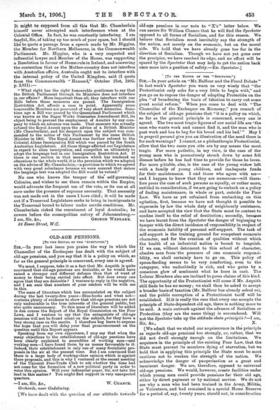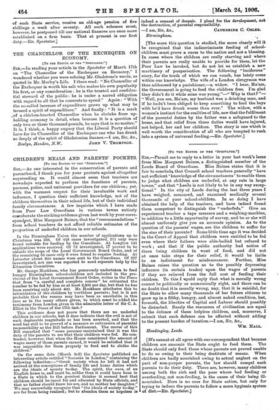[To THE EDITOR OP TER " SPECTATOR:1
SIE,—In your article on "Mr. Balfour and the Fiscal Debate " in last week's Spectator you warn us very wisely that "the Protectionist only asks for a very little to begin with," and you go on to expose the danger of adopting Protection on the plea "of broadening the basis of taxation to carry out some great social reform." When you come to deal with "The Chancellor of the Exchequer on Economy," you remark of the subject of old-age pensions that "it is a policy on which, so far as the general principle is concerned, every one ie agreed. The two most tragic figures of our social life are ' the man who wants work and cannot find it, and the man who is past work and has to beg for his bread and his bed.'" May I in proprid persona give you an illustration of the need there is for such warnings ? I cannot, as a philanthropic Protectionist, allow that the two cases you cite are by any means the most tragic. Far more pathetic, in my view, is the case of the young man who is prematurely struck down by some fell disease before he has had time to provide for those he loves. Far more pitiable, also, is the case of the young widow left with a family of young children, and inadequate funds for their maintenance. I and those who agree with me— and I happen to' know that they are numerous—will there- fore press the case of such persons as equally, or rather more, entitled to consideration, if we are going to embark on a policy of finding maintenance, in whole or part, outside the Poor Law. We have as yet refrained from embarking on this agitation, first, because we have not thought it possible to supersede by law the whole duty of neighbourly assistance, and have accepted the view that the State must be content to confine itself to the relief of destitution; secondly, because we have learnt from the Spectator the danger of beginiing to tamper with the direct incidence of responsibility in Aspect of the economic liability of personal self-support. The task of self-support is the training ground for competent economic character, and for the creation of qualities without which the health of an industrial nation is bound to languish. If we can, without detriment to this school of character, absolve men from- the pressure of one economic responsi- bility, .we shall certainly have to go on. This policy of spoon-feeding seems to be very comforting, even to the ratepayer, who undoubtedly is rich, and who gains by a conscious glow of sentiment what he loses in cash. The Labour Members also are inclined to press claims of this kind. The opportunity of the Protectionist will come if Mr. Asquith still finds be has no money; we shall then be asked to accept a broader basis of taxation (Mr. Balfour has already asked us), and the public corruption of a Protectionist tariff will be established. Mit is really the case that every one accepts the principle of State-dependent old age, there is nothing more to be said. A main outwork against the advance of Socialism or Protection (they are the same thing) is surrendered. Will not the Spectator take up the attitude obsta principiis ?—I am,
[We admit that we stated our acquiescence in the principle as regards old-age pensions too strongly, or, rather, that we did not dwell strongly enough on the limitations. We acquiesce in the principle of the existing Poor Law, that the State must prevent its members dying of starvation, but we hold that in applying this principle the State must be most cautious not to weaken the strength of the nation. We acknowledge the danger of pauperisation as a great and imminent danger. We are, therefore, opposed to universal old-age pensions. We would, however, create facilities under which young men could provide pensions for their old age,. either by direct payment or by national service. We do not see why a man who had been trained in the Army, Militia, or Volunteers, and had remained in a special Home Reserve for a period of, say, twenty years, should not; in consideration of such State service, receive an •old-age pension of five shillings a week after seventy. All such schemes must, however, be postponed till our national finances are once more established on a firm basis. That at present is our first duty.—En. Spectator.]











































 Previous page
Previous page